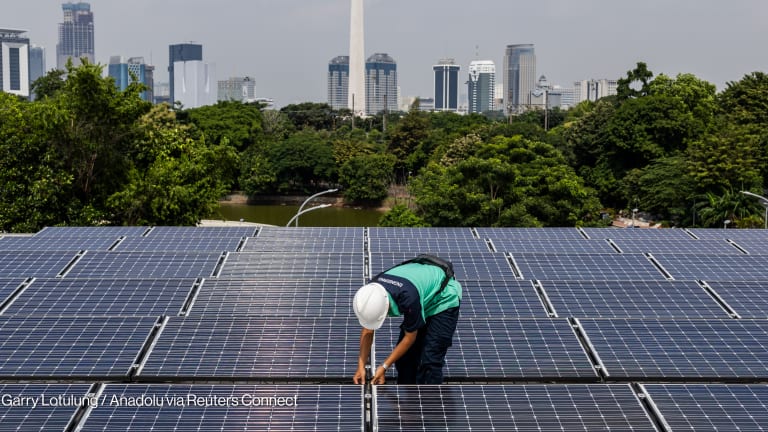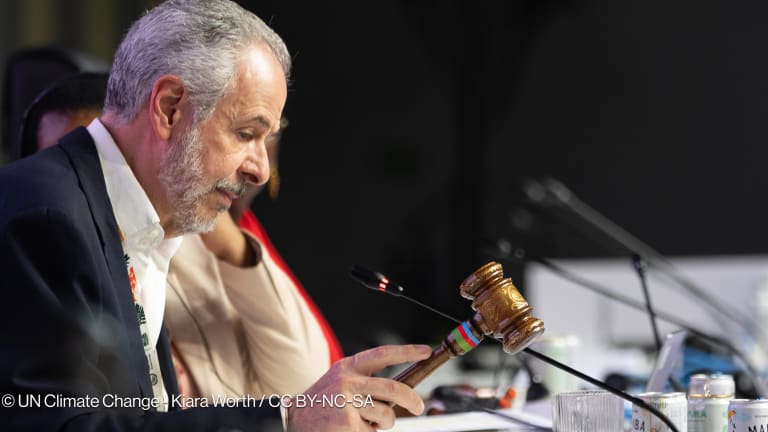
LONDON — Even as most of the world’s governments publicly accept the urgency of the climate crisis, fossil fuels continue to burn and carbon continues to pollute the atmosphere.
With the climate crisis escalating, the use of official development assistance to help develop oil and gas infrastructure in low-income countries has come under intense scrutiny.
A 2019 Organisation for Economic Co-operation and Development report estimated that, on average, at least $3.9 billion in official development finance annually went on supporting fossil fuel activity in 2016 and 2017.
Advocates of continued investment in fossil fuel projects, particularly gas, say there is no choice if low-income countries are to gain a reliable energy base and develop, presenting it as a necessary transition phase on the road to greener options.
“We really are through the point where we need gas or any fossil fuel to transition. This whole narrative, it's just an excuse. You’ve got all these experts in oil and gas who are good at selling their product.”
— Clare Shakya, director of climate change, International Institute for Environment and DevelopmentBut there is a growing consensus among climate experts that — thanks to advances in technology and energy systems — ODA funding for fossil fuels is no longer required for the world’s lowest-income countries to develop.
More on energy transition:
► Gridworks: Why the UK is taking a risk on investing in power transmission in Africa (Pro)
“Looking at the climate targets the world has committed to ... it’s very clear we need to phase out fossil fuels as soon as possible,” said Ipek Gencsu, research fellow at the Overseas Development Institute, a London-based think tank. “Continued investment in any fossil fuel infrastructure goes against that high-level goal [of limiting climate change] … The explanations and excuses about development are something of the past.”
Gencsu said the increased competitiveness of the cost of renewables and the ability to generate and distribute power independently of centralized grid systems meant further investment in fossil fuels was “not justified anymore.”
‘No alternative’
In the United Kingdom, the Private Infrastructure Development Group, a development finance institution, was recently at the center of a media furore for making $750 million of fossil fuel investments between 2002-2018.
The group receives significant funding from the U.K. Department for International Development, which defended its investment amid the outcry. “We know developing countries rely on energy from a range of sources and the UK can help them move towards clean energy,” it said in a statement.
The government insists it is “taking urgent action to tackle climate change” and has increased funding to clean energy and other climate-related initiatives. But simultaneously, it continues to facilitate nonrenewable energy projects. The recent U.K.-Africa Investment Summit, funded and organized by DFID, saw around £2 billion ($2.5 billion) worth of fossil fuel deals completed.
In an interview with Devex, PIDG CEO Philippe Valahu, said that over the past three years, renewable energy accounted for 75% of its energy investments, with the remaining 25% in gas. Most of PIDG’s exposure is in fragile and conflict-affected states with very low rates of electrification, he added. Those countries have a “desperate need for baseline [energy] capacity” to meet the needs of their populations, as well as the needs of nascent local industries, such as manufacturing. Achieving that with renewables alone is “just not feasible.”
As a result, he said, PIDG considers funding fossil fuel infrastructure “if it's in a country that is so desperate that it has no alternative … [and] as long as we can see there is a phasing towards renewables.”
Valahu said that an extensive decision making process is used when deciding to invest in gas-fired power plants, often converting them from heavy fuel oil power plants, “which reduces significant CO2 emissions,” adding that certain industries “cannot be fired [or] electrified through renewables.”
A key consideration is the duration of the project, and if it can be decommissioned by 2050. “That's fully in line with international guidelines about the energy sector” and alignment with the 2015 Paris Agreement on limiting global warming, Valahu added.
A similar decision-making process was described to Devex in a statement by CDC Group, the U.K. government-owned development finance institution.
New opportunities
As recently as a few years ago, Clare Shakya, director of climate change at the International Institute for Environment and Development, was supportive of using ODA to fund fossil fuel infrastructure.
“I felt there were too few options [for energy access in low-income countries]: We needed a transition response within a grid system for it to operate well, especially gas,” she told Devex.
But she said her view, like others, has changed in response to improved research, evidence, and energy storage technology, particularly around batteries, solar, and hydropower. Financial markets shifting to renewables is also a factor.
“We really are through the point where we need gas or any fossil fuel to transition,” Shakya said. “This whole narrative, it's just an excuse. You’ve got all these experts in oil and gas who are good at selling their product.”
In recent years, she said concerns over the stability of renewables have been allayed. “Lots of analysis by energy regulators and researchers as well as experimentation by the companies generating energy have demonstrated that we have solutions,” Shakya said. “We know so much more.”
“It is clear there are vested interests who will use any reason or excuse to continue fossil fuel extraction. If that means arguing that gas is cleaner than coal, then they will do that.”
— Dario Kenner, visiting fellow, Anglia Ruskin University,She took issue with converting oil-fired plants to gas, instead of prioritizing renewable alternatives.
“In most cases, we are talking about massive infrastructure change because ... the infrastructure requirements are far lower for a liquid than a gas,” she said. Some worry about the prospect of new gas projects becoming “stranded assets” as international markets and consumers shift toward renewables, leaving the governments of low-income countries with loans for worthless equipment.
While investors often argue that gas is a “cleaner” fossil fuel, the use of which aligns with the Paris Agreement on climate change, that idea has been heavily criticized by environmental campaigners, who say burning it still causes dangerous levels of carbon emissions.
EIB to end fossil fuel lending by 2022
The European Investment Bank's board of directors finally agreed to an "ambitious" new climate investment strategy after marathon talks.
For Shakya, “a lot needs to be done in energy grids that isn’t being done at the moment … At the moment what’s happening is [that] developing world countries are receiving a lot of project funding for generation only, and nothing on the management of the grid.”
Another issue countries must contend with is the “inertia” of financing mechanisms for renewable energy sources, Gencsu said, while financing mechanisms for fossil fuel projects are “tried and tested.”
Recipient countries “often feel fossil fuel financing are the only things available to them in the short term,” she said. “Countries that are providing ODA have a much higher responsibility in making the transition easier for those countries and making them understand financing is available.”
Hard but not impossible
Underlining many of the arguments against using aid for fossil fuels is a wariness of the traditional energy industry and its political power.
“It is clear there are vested interests who will use any reason or excuse to continue fossil fuel extraction. If that means arguing that gas is cleaner than coal, then they will do that,” said Dario Kenner, a visiting fellow at Anglia Ruskin University, whose research includes climate change and sustainable consumption.
None of the experts interviewed believes that moving entirely to renewables will be easy. “It is hard but it's not impossible … we’ve got to be braver and more innovative,” Shakya said.
For Gencsu, even decommissioning gas-fired power plants by 2050 is “too late.”
“There might be one or two projects out there that if you can do in a very controlled and short-term way and that is the only thing available [then perhaps it can be justified] but definitely not at the scale that is being done right now,” she said.
“If you look at the amount of carbon budget we’ve got and the amount of gas infrastructure we’ve got, our production plans are way over exceeding our targets.”
Update, March 6, 2020: This story was amended to clarify that $3.9 billion of official development finance went to fossil fuel activity in 2016-2017. This figure includes official development assistance, as well as non-concessional development financing from donors outside the OECD’s Development Assistance Committee.








